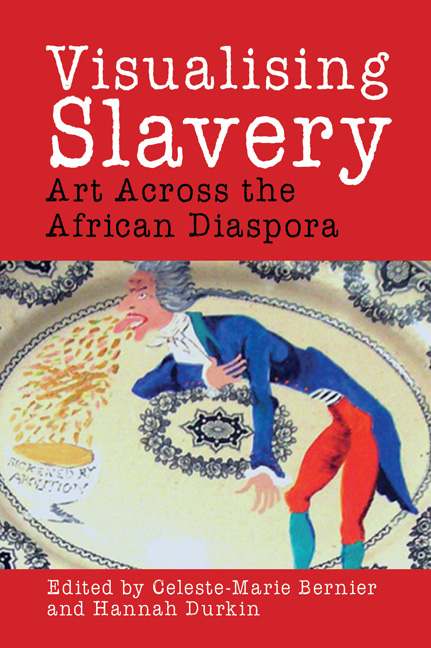Book contents
- Frontmatter
- Dedication
- Contents
- List of Illustrations
- Acknowledgements
- Introduction: ‘Inside the Invisible’: African Diasporic Artists Visualise Transatlantic Slavery
- Part I Slavery and Memory in Contemporary African Diasporic Art
- Chapter 1 Lost and Found at the Swap Meet: Betye Saar and the Everyday Object
- Chapter 2 Preserves
- Chapter 3 What Goes without Saying
- Chapter 4 Spectres in the Postcolonies: Reimagining Violence and Resistance
- Chapter 5 Strategic Remembering and Tactical Forgetfulness in Depicting the Plantation: A Personal Account
- Part II Historical Iconography and Visualising Transatlantic Slavery
- Part III African Diasporic Monuments and Memorialisation
- Part IV Contemporary Legacies in African Diasporic Art
- Afterword: Against the Grain: Contingency and Found Objects
- Notes on Contributors
- Index
- Platesection
Chapter 5 - Strategic Remembering and Tactical Forgetfulness in Depicting the Plantation: A Personal Account
from Part I - Slavery and Memory in Contemporary African Diasporic Art
- Frontmatter
- Dedication
- Contents
- List of Illustrations
- Acknowledgements
- Introduction: ‘Inside the Invisible’: African Diasporic Artists Visualise Transatlantic Slavery
- Part I Slavery and Memory in Contemporary African Diasporic Art
- Chapter 1 Lost and Found at the Swap Meet: Betye Saar and the Everyday Object
- Chapter 2 Preserves
- Chapter 3 What Goes without Saying
- Chapter 4 Spectres in the Postcolonies: Reimagining Violence and Resistance
- Chapter 5 Strategic Remembering and Tactical Forgetfulness in Depicting the Plantation: A Personal Account
- Part II Historical Iconography and Visualising Transatlantic Slavery
- Part III African Diasporic Monuments and Memorialisation
- Part IV Contemporary Legacies in African Diasporic Art
- Afterword: Against the Grain: Contingency and Found Objects
- Notes on Contributors
- Index
- Platesection
Summary
Thirty years ago I was an 11-year-old growing up in West London. One evening I sat down with my family to watch a new television programme called Roots. It was a moment that changed my life. By the end of the series I told my mother that I would one day trace my heritage back to Africa and reclaim my ancestral name.
Kwame Kwei-Armah, March 2007During the evening of 8 April 1977, the first episode of a television mini-series called Roots, originally made for the American ABC Network, was screened in the UK by the BBC. In the above account, British actor and playwright Kwame Kwei-Armah offers a personal narrative reflecting on the shared and monumental impact which the televisual reworking of Alex Haley's 1976 novel Roots: The Saga of an American Family had on the emerging political and historical consciousness of a generation of young people living in the UK. These were young people whose ancestors had taken a multigenerational journey from West Africa to the UK via the terrors of the Middle Passage and the grinding cruelties of chattel slavery on the plantations of the ‘New World’, specifically in this instance those of the British-held islands of the Caribbean.
The fact that Roots had been constructed as a history engrained within the antebellum South of the US creates a slight but significant moment of slippage in the perceptions of the UK-based audience. For Haley, its relationship to a specifically US history is key. It is not only inbuilt in the book's subtitle ‘Saga of an American Family’, but was also, through its year of publication, 1976, inextricably linked to bicentennial celebrations of US nationhood. Haley himself was to claim on the book's dedication page that ‘just by chance it is being published on the Bicentennial year of the United States, So I dedicate Roots as a birthday offering to my country within which Roots happened’. It also becomes necessary, I would argue, to locate Roots within the politics of the African American ‘Civil Rights’ struggle as it continued to evolve through the 1960s and into the mid-1970s, and in which the concept of Black American genealogy as deeply embedded within the national narrative of the United States became an essential element in calls for full social, economic and political enfranchisement.
- Type
- Chapter
- Information
- Visualising SlaveryArt Across the African Diaspora, pp. 62 - 78Publisher: Liverpool University PressPrint publication year: 2016

